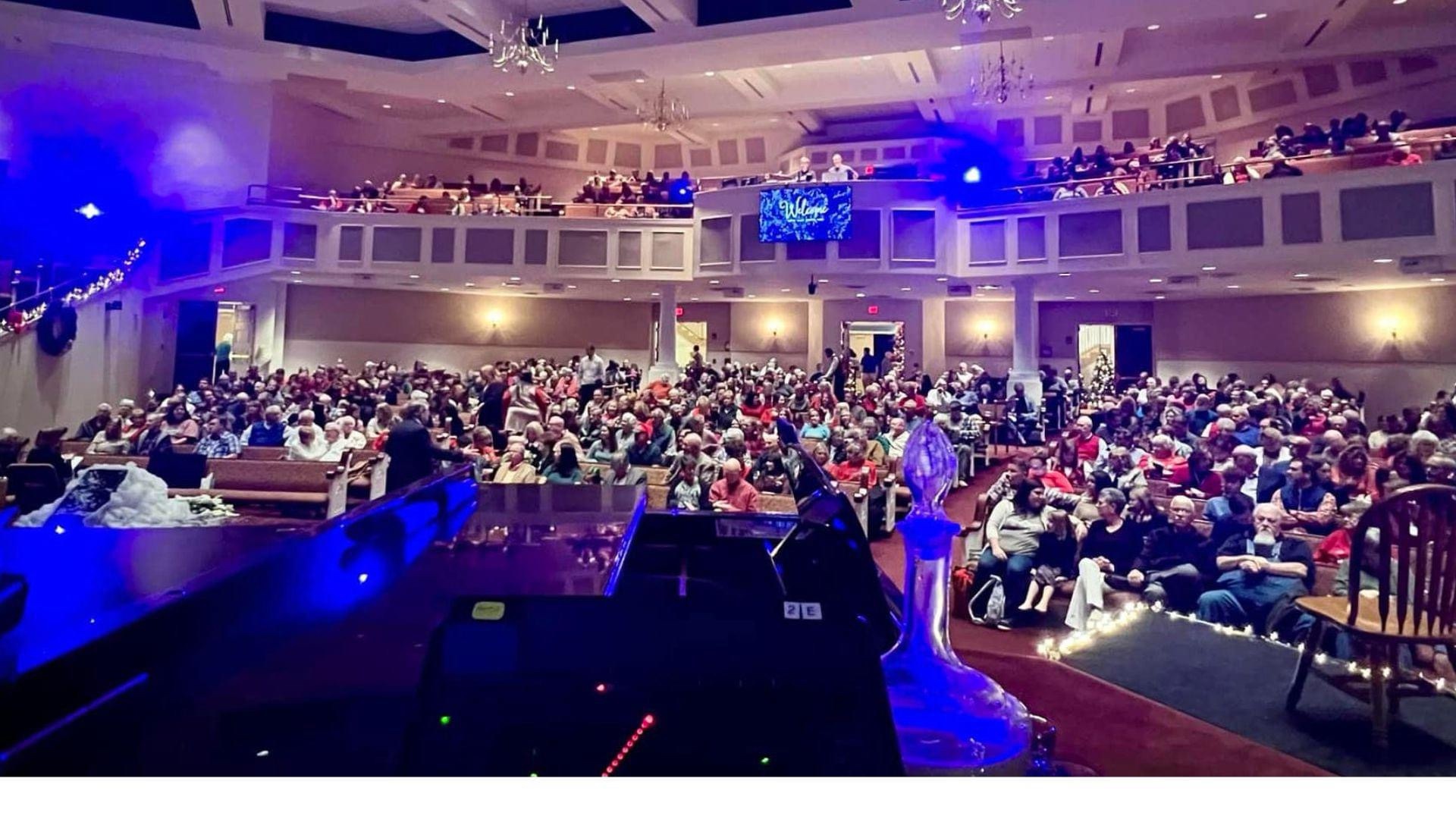As a child, I took two allergy shots every week from the age of 6 to 17. I always wondered why I felt a little draggy the day after I took the shot, until I discovered that they were actually injecting me with some of the very stuff that caused my sinuses to flair up. And if you take a flu shot, most times you are receiving a weak strain of that actual flu, so that you body will build up its defenses for when the real thing comes along.
I’m afraid that we’ve done something similar in the church, but with tragic results. By subjecting church members to years of weak and impotent worship, we’ve inoculated them against ever catching a real passion for God. After years of enduring services where no one expects God to move, they’ve begun to think that’s the way church is supposed to be. After all, good medicine is supposed to taste bad, right?
I grew up in a Southern Baptist church, and our denomination has always been known for it’s preaching of the Word of God. However, in all those years growing up, I had never heard a sermon delivered on one of the most important ideas in the Bible…
I never heard one sermon or attended one class on the topic of Biblical worship.
We were told that we were supposed to come to worship services, and that we had better not worship any other gods or we’d be in big trouble. But as to how we were supposed to accomplish this worship, or just what God desired in it, we were left totally in the dark. Worship was just the “stuff” we did on Sundays. It involved singing songs about God, giving an offering, and hearing a sermon. It never seemed to occur to anyone why we were doing this, or rather, for Whom we were doing it.
I’d like for you to take a few minutes to give your own church a “checkup”. God wants to work through the worship in your church to change lives and draw people into His glorious presence. But He is not allowed to do that at every church. Is He allowed to move freely at your church?
Is your church “real” or “surreal”?
Authenticity is important for corporate worship to touch the heart of God as well as minister to congregation. If worship is always uptempo and surface, worshippers will not discover how to worship God in their times of hurt and need. If sermons approach life’s difficulties with easy do-it-yourself formulas for self-improvement, people will think church is not a place where they can be real about their pain and disappointments.
Just as it is important that worship touches the full spectrum of human emotions, you must always guard against worship becoming simply an emotional experience. While I’ve been frustrated with the dryness of many of the Baptist services I’ve attended, it is just as pointless to have emotion as an end in itself. When I’ve seen someone worshipping in a strange manner that is not prescribed in Scripture, I can’t help but wonder about their heart-motive. In some “revivals” around the world people have barked like a dog, or other outlandish manifestation. These kinds of expressions not only have no foundation in Scripture, they are not natural expressions of authentic human responses to God.
When you get excited at a ball game, you might jump up and down, but you don’t usually run around the whole stadium. Yet I was in a service once where a woman ran circles around the sanctuary (I was afraid one of the teenagers was going to stick his foot out to trip her, just for fun!). And at the birth of your child, you would rarely feel the urge to bark like a Chihuahua. Likewise, there are some things that have gone on in the name of “worship” that strike me as a desire for attention rather than passion for God. And as open minded as I’d like to be about how God leads people differently, sometimes “weird” is not spiritual…it’s just weird!
While acknowledging that abuses occur, we still need to be careful about discouraging someone’s expressions of worship unless it is truly causing disruption in the church. There are some things that brother and sisters in Christ do in services that really irritate me. Occasionally, a person’s way of gesturing or singing may be a source of chagrin for me personally. But if I am going to ask them to stop, I need to have good Biblical footing to make that request. If I’m not careful, I can not only hurt someone’s feeling, but I may also grieve the Holy Spirit.
If you counsel with someone who you believe is a true distraction to the congregation’s worship, you might approach them with a question. You could say, “Regardless of your motive, is what you are doing calling more attention to the Lord, or to you?” If they are truly sensitive to the Holy Spirit, this may cause the believer to rethink how their worship affects others. Though they may have the “right” to do it, it may not be what is best for the Body as a whole. When your heart is set on the Lord, it’s possible to forget there are others around you trying to worship too. We need to find a way to give God all the glory He is due, while still respecting the need of others to worship also.
Whatever we do, just be sure we “keep it real”. While lack of participation is discouraging, if they have to shoot you with a tranquilizer gun to end the service, you’ve probably gone too far. Worship should be a place where lives are changed by the power of the living God. God doesn’t need our help by trying to stir up emotions. When God shows up in worship, don’t worry…it will be exciting enough without any of our manipulation.
And while you want to be well prepared for your service, be careful making things “too perfect”. I’ve seen praise teams that were cued to make a dramatic move to the edge of the stage in unison, usually at a key change or high point of the song. While that kind of thing works well in Vegas, it can make a time of worship look more like a mere performance. The congregation will respond by watching the “show” and not participating. Too much slickness takes away from the authenticity of what God is doing.
Is worship a priority in your church?
Every minister I’ve ever met would say that worship is an important ingredient in their services. Yet a look at their worship orders will betray a lack of attention given to the practice of worship itself. Time is taken up for numerous announcements of church activities, those sick in the hospital, and the welcoming of guests. There may also be numerous performance numbers done by soloists or the choir in which the congregation is not encouraged to participate.
I have also known a few pastors whose sermon length does not allow ample time for worship to go on beforehand. When this subject came up once in a conversation, one lady informed me that it was OK because “only the sermon matters anyway”. As important as a sermon is to a worship service, a wise pastor desires for true worship to take place before they deliver the Word of God.
In truth, the sermon is for you. The worship is what we do for God. So when you neglect the worship, you’re just being selfish.
What are the things in your service that take up time that could be used worshipping the Father? As much as we want to meet the needs of people, our first priority must be blessing our the Lord, not placating the people. We need to prioritize time for worship, so that God’s Spirit is allowed to move and work among His people.
Does the music encourage the congregation to worship, or to watch?
If your people are predominantly rural folks, you probably need to pick a style of music that they can relate to easily (Southern Gospel and hymns). If they are young urbanites, something with a contemporary edge would probably fit well. Either way, the music needs to be an encouragement to worship – not an impediment. But if the congregation has trouble relating to the style of music, it will be hard for them to get to a place where their attention moves away from the music and onto the Lord. And while variety does keep things interesting, you need to find a “median style” and gravitate toward it with occasional exceptions.
Whatever style you pick, singing it with passion and conviction is what makes the difference. I saw one church’s service on TV recently that was trying to update their music. I had watched their program before and felt their worship was very dry and passionless. As I watched their “new & improved” service, they were singing modern praise choruses… but they sang them with the same lack of enthusiasm that they gave the old hymns before!
They are completely missing the point. It doesn’t matter so much what style of music you sing as how you sing it! You can drain the life out of just about any piece of music if you sing with apathy. Bu you’d be surprised how people will respond to different styles of music when the song is simply sung with conviction. That’s why a group of teenagers can sing an edgier sounding song in a service with senior adults and get away with it. Their enthusiasm “sells” it to the congregation.
Is there a flow to your service outline?
In looking at a diagram for the Temple from the Old Testament, we can see an outline for how we enter in to worship. The Bible says to “enter His gates with Thanksgiving” and “His courts with praise”, which would seem to suggest a logical progression. I start my services with more uptempo, “lighter” worship songs to get the congregation moved through the “front door” of worship. As we move farther into the presence of the Lord, the music gradually becomes more and more intense and passionate. We end up in His presence at the Holy of Holies.
I think God set it up this way because He understands people. We don’t always walk into a worship service floating on a cloud of warm fuzzy feelings. It takes us a while to shake off the “spirit of heaviness” and put on the “garment of praise”. In the opening worship set, I try to grab their attention and put it on what the Lord has done for them personally. As the service progresses, we focus more on worshipping God for who He is than for what He has given us or done for us. Hopefully, by the time the Pastor gets up to deliver the message from God’s Word, we have a clear picture of who God is and have invited His presence into the service.
Grouping songs based on tempo as well as theme is desirable when possible, as well as transitioning between songs without jarring stops and restarts. How well you pull this off will be determined by your general knowledge of music and key signatures to some extent, so it may come easier to some people than others. But regardless of musical knowledge, the goal is to make things move from one element to the other with as much grace as possible.
Is the atmosphere conducive to worship?
As we get into a more intense and intimate time of worship, I will often ask that the house lights be lowered. But I’m not doing this so that the service seems more like a performance. I’ve found some people (especially men) worship better if they feel no one is looking at them. Lowering the house lights takes away some of the congregation’s self-consciousness, and allows them to more freely focus on the Lord.
Here again, you want to be careful about getting carried away with too much affected lighting. While special lighting effects are a big part of a pop music concert, they can give worship an artificial feel. I try to avoid any lighting effects that call attention to themselves. The more subtle the better. Make any changes in lighting with as little fanfare as possible.
Does the sound constantly distract from your service? Today’s sound boards are not meant to be operated by just anyone. Also, just because someone understands electronics doesn’t mean they have an ear for mixing instrumentation and vocals. The people who come to our churches today are used to digital quality sound. When your church budget can stand it, I’d suggest hiring a professional who will run the system part-time for Sunday services.
Do the people on the platform blend in or stand out from the worship? While you never want church to become a beauty pageant, people on the praise team or in the choir need to be encouraged to look their very best…whatever that is. I personally am happy men can now feel free to untuck their shirts, as I’ve often felt my belly could become a focal point in worship. Likewise, we don’t need to try to look sexy or provocative. Avoid anything that takes attention off the Lord.
While trying to get everyone’s clothes to match seems overboard, everyone should look just a touch sharper than the average church member. That level of dress varies from church to church, but you should dress to communicate that something special is going on.
Do you allow time for God to change lives?
If everything in your service is over-programmed, you may be guilty of not leaving time for the Holy Spirit to work in people’s lives. While planning the sermon and preparing the music are important, the most important work in hearts is done not by our efforts but by the Spirit of God. You need to allow time for God to work and move among your people, and not just speed from song to song to sermon.
I started having a time of prayer at the altar after our first set of music, when the worship begins to be more passionate. We ask those who have a need to move to the altar area and humble themselves before the Lord and laying that need at His feet. Other people will always flow forward to pray with them, placing a hand on their shoulders to let them know that someone is lifting them up before the Father. We will usually repeat some gentle praise chorus in the background while this is happening, so worship can continue for those who may not have a particular need that week. We have found that this is the favorite time in our service for most people who attend.
Although I know this goes against the grain of much of the advice pastors are getting, I would also encourage you to have some kind of decision time at the end of your service. I believe that people do need an opportunity to publicly respond to what God is doing in their hearts. One of the biggest problems I see with most services is that there are too few opportunities for people to respond to what God is doing in the room.
Having a specific time of decision, invitation, or altar call allows another way for people to be involved in worship and not just observe it. It also helps the ministers know how God may be working, and leads us to minister to some whose needs might not be known otherwise.
Does God leave your service honored by the worship?
In worship, the goal is not to entertain the congregation, but to be a personal blessing to the Lord himself. Just think of it… there are few things you can do that are a direct blessing just to the Lord. We all know that you can benefit His church through acts of service, tithes and offerings. But in worship, you are actually ministering personally to God, and that is nothing short of the highest and holiest calling I can imagine!
And if you look to the Bible, you will see that God gives very specific ingredients that He expects to be present in worship. In fact, sometimes God was downright picky about how His people went about worshipping Him. For starters, Cain’s worship was not acceptable to God because He didn’t offer a blood sacrifice as God prescribed, but instead offered the fruit of his own crops. This was Cain’s preference in worship, and it was much more convenient for him than going and getting an animal to sacrifice.
But just as Cain’s convenience and comfort were not the issue, so our preferences are no excuse for not being a blessing to the Father in worship.
Churchgoers every Sunday are substituting their own preferences (or excuses) in worship for what God desires. So if we are uncomfortable with singing in worship, we just refuse to sing. If we grew up with no clapping in services, we simply refrain from clapping. And if we think that lifting our hands in praise might lead someone to look at us oddly, we worship with our hands conveniently at their sides. Little we do is based on what God says He wants, but on what is “comfortable” for us. But God has let us know through His Word what He wants from our worship. And if worship is really about God’s desires and not ours, perhaps we should learn to be better hosts and hostesses to Him on Sunday!
My wife Dawn is a terrific hostess. She delights in inviting people to our home for a meal, and if we ever get around to inviting you, come with an appetite! You will be continuously pampered and encouraged to gorge yourself with food.
Likewise, I love having friends over, and my job is entertainment through off-the-wall humor and conversation. I love to put people at ease, so you never have to worry about being guilt-tripped into one of those embarrassing party games we all hate at other people’s parties. Whatever we end up doing, by the end of the evening your shoes will be off and your belt will be loosened by at least one notch.
That should be our attitude toward the Lord when we enter worship: how can we bring pleasure to our Father. You see, WE are the hosts and the Lord is our guest of honor.
The question that most churches today are asking is, “How do we make people more comfortable in our services” when they should be asking, “How do we make GOD more honored and welcomed by our worship?”
We need to understand our addiction to our own preferences in worship is a serious problem. We have bought the lie that we can worship God any way we want to. You might want to ask King David and Uzzah about how that idea worked for them in 2 Samuel, chapter 6. It was more convenient for them to move the Ark of the Covenant with an ox cart than to go to the trouble of doing it the way God had prescribed. But when Uzzah fell over dead while touching the Ark (against the rules), David suddenly realized the hard way that worship was not about his preference, nor his convenience. Worship is about hosting our very Special Guest, and to be a good host we must go to great lengths to give the Guest what He wants…even if it’s at the expense of what we desire.
Many of us might be ashamed to admit the true state of our church’s worship. But admitting our neediness before God is the first step toward the repentance of dry-eyed worship. By humbling ourselves before Him and putting God first, we put ourselves in the position for Him to revive us and resurrect our worship!




